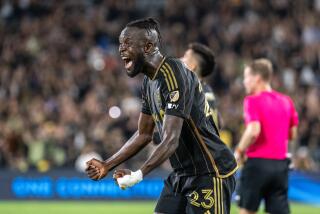English Fans Growing Fond of an American Max Factor
- Share via
LIVERPOOL, England — When Joe-Max Moore arrived two months ago at the once-proud English soccer club Everton, skeptics christened him Joe-Max Less.
Stumped by the hyphen in his name, radio and TV broadcasters lopped off the “Joe” and incorrectly called him Max Moore. The former Mission Viejo High and UCLA star had his own doubts when he was assigned No. 23--a measure of his distance from the starting 11.
“You know, we never think Americans can play football, what they call soccer,” admitted Neil Thomason, browsing in the club’s gift shop. “I’d never heard of him and I don’t think anybody here had, either.”
That’s all changed. Moore has scored five goals in the last six games--four in the last four--as he tries to become the first American-born forward to make it in one of Europe’s top leagues.
The name has begun to stick around north Liverpool, a gritty neighborhood where Victorian gingerbread and squat row houses border the blue, galvanized facade of Everton’s Goodison Park stadium.
“It’s definitely the best atmosphere I’ve ever encountered,” said Moore, who was The Times’ Orange County player of the year in 1989 after leading Mission Viejo to the Southern Section 3-A title. “I’ve never experienced anything close to it. I mean, I’ve got men on the street walking up and giving me kisses. It’s just crazy.”
Just call it Everton’s “Max Factor.”
His wife, Martha, was stunned after her husband scored his first goal last month to salvage a 1-1 tie in the waning seconds as a substitute against Tottenham.
“An hour later, we were eating in an Italian restaurant and people were coming up patting him on the back, asking for autographs. They already knew who he was. I’d never seen anything like this in the States,” she said.
Moore’s first three goals were of the “poaching” variety as he scored on loose balls around the net. Nothing spectacular, but Everton Manager Walter Smith noticed he was the only player “in the box who had his feet moving,” ready to pounce.
His fourth--and his best--came on a low missile from 14 yards out that beat the Derby goalkeeper from a tight angle. His fifth, in a 2-1 loss last weekend against Aston Villa in the F.A. Cup quarterfinals, was a short flick into a tiny opening.
“I feel my confidence is really growing,” said Moore, who also played in Germany’s second division. “I was confident I could score if I was given the opportunity. Sometimes goals come in bunches, and that’s what’s happening for me now.”
A member of the 1994 and ’98 World Cup teams, Moore has scored wherever he’s played, including 20 goals in 79 games with the U.S. national side--No. 3 on the career list. At Mission Viejo, Moore had 25 goals and 14 assists in 1989. At UCLA, he led the Bruins in scoring as a sophomore and junior before skipping his senior season to join the national team.
A few American-born players have made it in goal, defense or midfield in the English Premier League, but forward is another matter. Imagine a French quarterback starting for the Dallas Cowboys or the Yankees recruiting a Russian pitcher.
South African-born Roy Wegerle, a nationalized American, has been the most successful U.S. forward abroad. He scored 18 goals in 1990-91 for Queens Park Rangers in the top English league, and 29 in 86 games for them. He also played with six other English teams.
Midfielder John Harkes probably made the biggest impact of any American when he became the first to score in England’s League Cup final at Wembley with Sheffield Wednesday. He also was the first American to play in the F.A. Cup final.
“I wouldn’t say it’s pressure. But there are quite a few people watching to see how I do, and the better I do the easier it will be for other Americans to do the same thing,” the 29-year-old Moore said.
Born in Tulsa, Okla., and transplanted to Irvine, Moore got into soccer when his father--Carl--owned a Tulsa-based team in the now-defunct North American Soccer League. His name also came from his dad. He liked the name Joe but also wanted to honor a friend named Max--hence Joe-Max.
Moore said he has been treated fairly but skeptically in England because “most of the people here don’t realize America has a national team. Fans here don’t even know we play the game. So I’ve put the onus on myself to prove it to them.”
* Times staff writer Dave McKibben contributed to this story.
More to Read
Go beyond the scoreboard
Get the latest on L.A.'s teams in the daily Sports Report newsletter.
You may occasionally receive promotional content from the Los Angeles Times.






